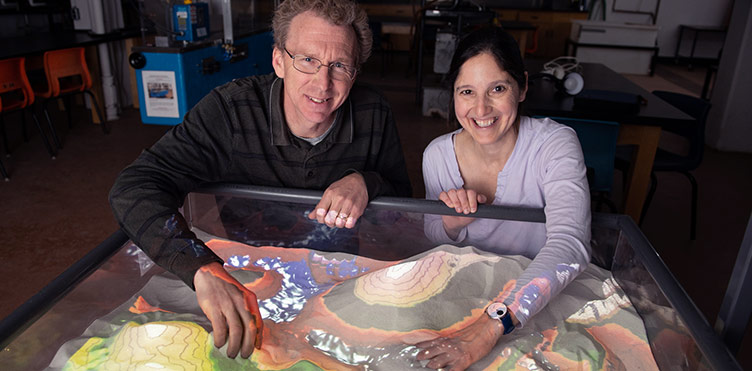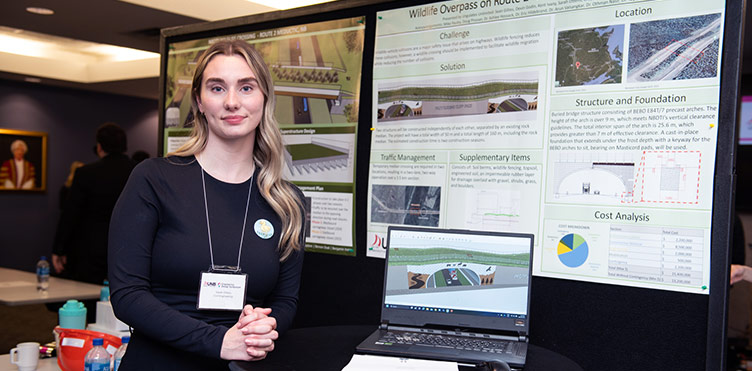Undergraduate program

Civil engineers make the grade
We set the standards, measure up (and sideways) and stand strong on stable foundations. Dedicate yourself to creating a safer and healthier world through the infrastructure that makes daily life possible.
Work where people, systems and the environment intersect.
UNB has trained engineers for 170 years - the first lecture in Canada took place here in 1853. And we have only improved with age, now training engineers for a climate-adapting world.
As a civil engineer you could:
- increase access to drinking water
- adapt our communities for climate change
- empower communities for disaster mitigation
- reduce global impact of material use
- extract natural resources ethically
- create an accessible built environment
- design and build affordable housing
- create agile transportation networks
- develop net-zero solutions for transportation and buildings
Our program prepares you for many options in civil engineering with a number of specializations to give you a path to a great career. Co-op career advancement work terms give you real-world experience, a chance to try new things, and confirm your learning choices.

Areas of specialization
Customize your learning and target what is important to you. Civil engineering offers six specializations so you can choose to focus on your dream career.
Construction
Did you play with blocks as a child? Do you like building things? Civil engineers in construction plan, manage, and optimize construction of many types of projects. This can include roads, buildings, dams, landfills, utility towers, and manufacturing facilities. This specialization involves:
- planning, design, and construction methods
- managing the procurement process
- coordinating people and materials
- managing the IT aspects of a project
- selecting the appropriate construction equipment and technologies
Geotechnical
All structures require stable foundations. Become an expert in the design of this connection between structure and soil. Deal with the largest and heaviest structures in the world such as earth-filled dams and embankments. Or create the foundations for structures constructed with steel and concrete. Consider environmental factors such as precipitation and evaporation as these are key to stable foundations. Geotechnical projects include:
- foundation design
- slope/trench stability analysis
- retaining wall design
Materials
Build structures that will stand the test of time by understanding the properties and behaviours of construction materials from supports to insulation. Design and use materials that are environment-friendly and climate-adapted. Expert use of materials aims for:
- low energy costs for production
- high durability and low maintenance
- materials that contain a high proportion of recycled and recyclable materials
Structural
No one wants a building to fall down unexpectedly. Structural engineers make sure that buildings are strong enough to stand tall. It is a push-pull battle of resistance to gravity and its effects on structures. Earthquakes, wind, and snow also create stresses and increase loads on buildings. Analyze and design structures to resist these stresses for their complete life cycle whether decades or even centuries long. Use the fundamentals of mathematics and physics along with innovative materials and construction methods. Maximize structure performance while minimizing costs with the right building materials.
Transportation
Travel far with this sub-discipline within civil engineering. Deal with issues under planning, design, operation, and maintenance of all forms of transportation. You can get involved with different transportation modes including:
- roads
- rail systems
- airports
- marine ports
- pipelines
Water and environmental
Water and environmental engineering integrate a range of interests, from the microbiology of wastewater treatment to the mathematics of hydraulic systems analysis. You could work on supplying safe drinking water systems, the design of environmental protection works such as wastewater treatment plants, and related environmental industries. Look around. What needs cleaning up or management for a healthier world? Dedicate yourself to a world that works better for people and the environment.

Geological engineering
This collaborative program between civil engineering and the department of earth sciences is another great option. You can really dig deep in this program.
The four-year Bachelor of Science in Engineering degree is the only program of its kind in Atlantic Canada. Choose from three learning streams: geoenvironmental, geotechnical, and mineral resources. You can build a career where you:
- investigate and design in rock and soil for stability on site for varied types of projects
- develop sustainable water supplies
- protect and treat water supplies
- do environmental audits and impact statements
- investigate and design remediation systems for contaminated sites
- explore for mineral and energy resources
Geological engineering program
We have two diploma options and work opportunities to enhance your skills.
- Diploma in Construction
- Diploma in Technology Management and Entrepreneurship (TME)
- Co-op designation with work terms in the Co-op Program
- construction companies
- water utilities
- transportation companies
- landfill and sanitation management
- an airport
- a port
- a railroad
- all levels of government
- private consulting firms
